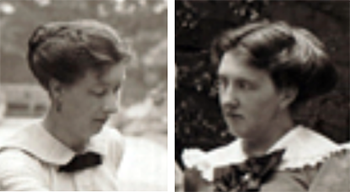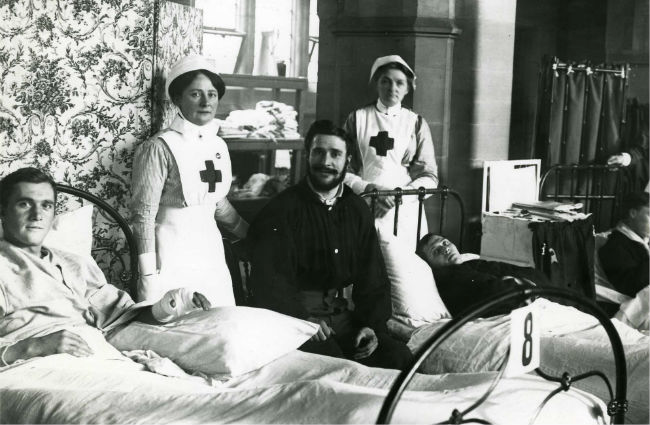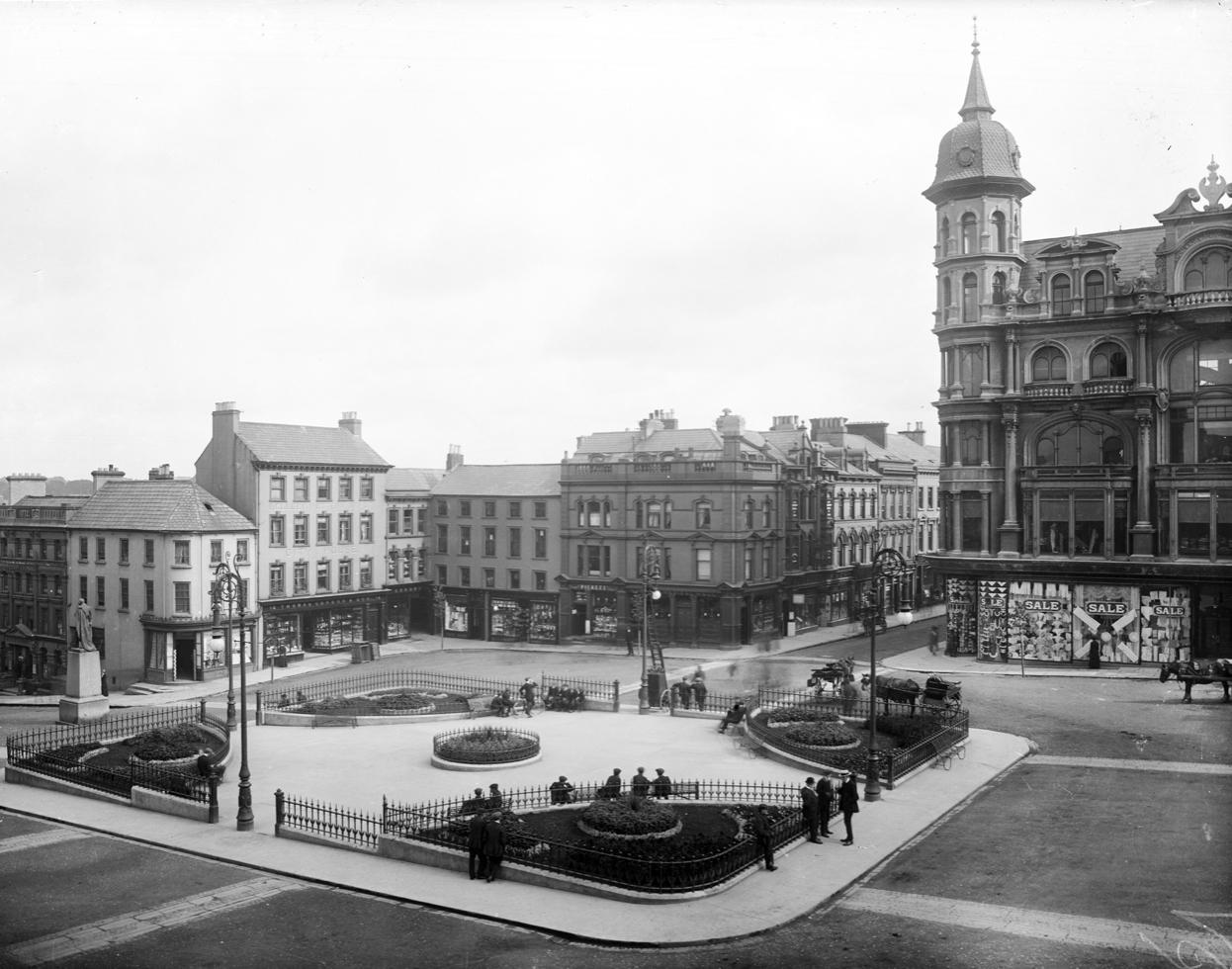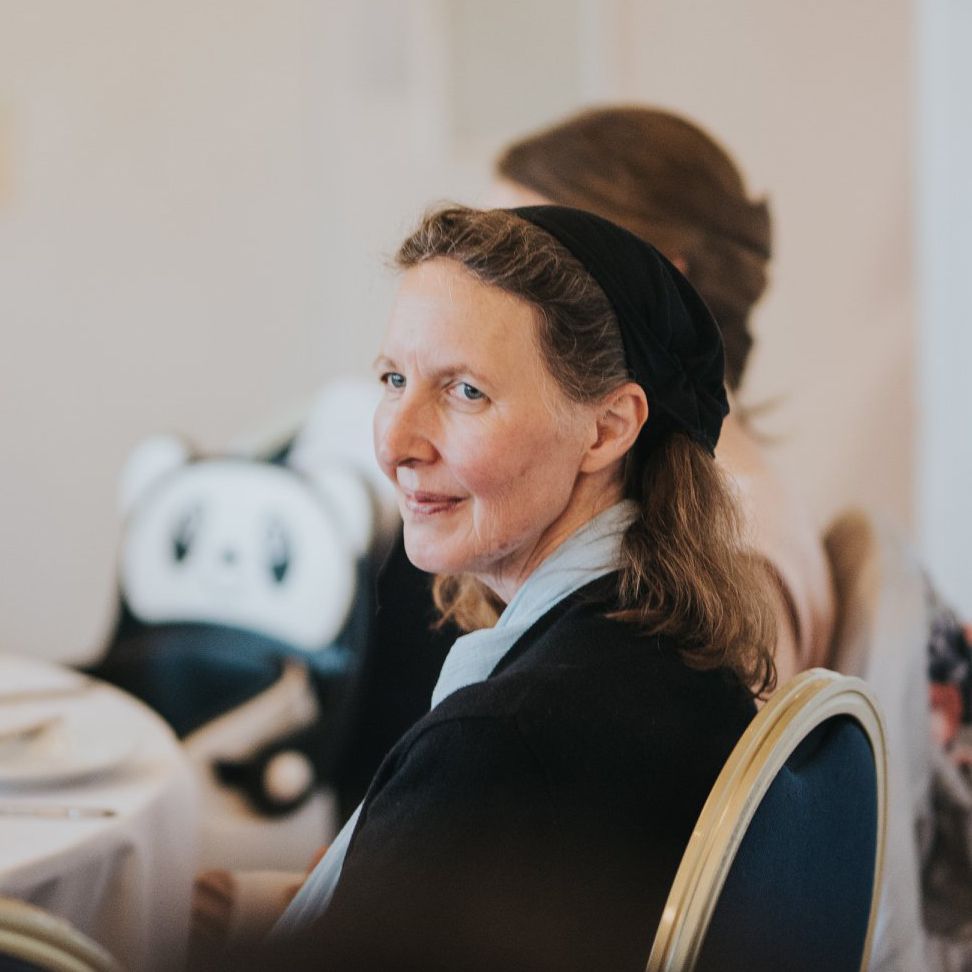6th July - Sixth Letter to Poppy
Secret diary: Tues. Croquet Priest Raid as guard discovered old man
Official diary: No entry for the 6th
Location: Brennan’s of Clonmoney
Tuesday
My darling Pip,
It was a relief to get the telegram yesterday and hear you are both going on well. Our friend the doctor was pretty well out in his calculations. It looked at first as though things might have been bad with you. Anyhow now its all right. Havent had any letters yet, but still hope for the best. I wonder whether you are at the Hall, think you must be as you couldn’t have got up to town in time. Hope the heir does credit to his parents, and doesn’t make too much noise; anyhow you are quite pleased with him.
I still do little else but sleep and eat, am quite comfortable, sitting in front of a fire just now, in July too!! Everyone very kind and nice. It rains most days. Havent still the faintest idea when I shall get out, hope before long.
Dont forget to keep the address to yourself, otherwise your letters wont reach me. It is difficult to write you a decent letter when I cant tell you all that is going on. Everyone here was very sympathetic when they heard about the baby, and did all they could to get news of you. You would be amused to see my present luggage, which consists of a small brown paper parcel, it has done me very well for 10 days now. I got a proper bath a couple of days ago.
Has Cecil’s and Kitty’s visits been knocked on the head by this; anyhow Cecil is lucky to be out of Derry. Has she found a house yet; and have you found a house or rooms? I expect there will be advertisements of houses in the S.W. of England waiting for me when I get back, as I wrote to Exeter for a catalogue the other day.
I wish I could see you both again, but it oughtn’t to be long now. Look after yourself and the boy.
With lots of love.
your c
Sixth Letter sent to Mrs C.H. Tindall Lucas, The Hall, Welwyn, Herts England it is unclear which day it arrived on but was redirected to 1 Cleveland Gardens, Hyde Park LONDON W2 postmarked Eastbourne 10 July 1920.

Poppy, despite having been through the trauma of the past few hours, was still determined to do what she could for her husband. Army officers and government officials might be flapping about indecisively, scouring the countryside with planes and hordes of men, getting nowhere, but Poppy wasn't going to sit back and do nothing. She was descended from Aoife MacMurrough (c. 1145 – 1188, Irish: Aoife Ní Diarmait), also known as Eva of Leinster. Aoife led troops in battle and is sometimes known as Red Eva . She was an Irish noble, princess of Leinster and countess of Pembroke. Poppy’s McMurrough genes were maybe kicking into action with the spirit of Red Eva, and once again a wife was ready to fight for her husband!
Poppy might not have been physically up to reaching CHTL but she used her ingenuity to contact him. Her little act of defiance against sense and convention was to send CHTL a telegram c/o of the Irish Republican Army, Ireland. She was not going to let another conflict prevent her from communicating with her beloved C, especially as now she had the much longed for news that they were the proud parents of a son. Poppy's feisty gamble paid off and to CHTL's incredulity the telegram reached him.
CHTL was anxious about Poppy and the safe arrival of his child. In May 1918, CHTL’s sister Cecil was expecting her first baby at the grand old age of 35. Her husband Milles was stationed not far from CHTL. All the family were on tenterhooks awaiting the happy event: “I wish Cecil would hurry up and get it over, Milles is very anxious to hear & telephones or wires at intervals”, wrote CHTL to Poppy from France on Thursday May 2nd 1918. When news eventually reached CHTL it wasn’t good:
I feel so sorry for poor Cecil after all she has had to put up with, and all the clothes she has made. Milles got my wire yesterday. I got an answer from him today. He is trying to get leave but don’t think he will succeed.
May 11th 1918
When Poppy’s brother Toby and sister-in-law had twins a few days later, CHTL was delighted - but there was also a shadow cast by Cecil’s loss:
How splendid of Molly. I hope they are both pleased, and don’t feel that you can have too much of a good thing. Twins are always most interesting all through life. It is sad that Cecil couldn’t have had one of them. Got a very sad letter from Milles yesterday, he is very cut up about it, and all he thinks of now is getting home to her which he wont be able to do.
Wed 15th May 1918
The outwardly emotion-free soldier had a very tender heart. “Poor old Cecil is rather sad but it will be forgotten next time it comes off all right.”
Happily Cecil and Milles did have a healthy son the following year, but the baby they lost would never be forgotten.
So hearing of the safe arrival of his son was just what CHTL needed to hear. Volunteer Mr Joseph Good was the bearer of the happy tidings:
A few days after ambush near Glin, I received a dispatch from Michael Brennan asking me to come to Clare. Some suspicious visitors were installed in a hotel near where General Lucas was held prisoner. Lucas and his guard, which included Mick Brennan, were quartered in a big house near Meelick in Co. Clare. I had intercepted a telegram which was addressed to Lucas while I was in Limerick; it was addressed to "General Lucas, c/o the Sinn Feiners, I.R.A., Cork". It ran something like this: "Born this morning a son. Both doing well" and then his wife's name. The telegram had been sent to Cork, was abstracted and a copy brought by dispatch rider to Limerick. I took it with me to Clare. Brennan gave the telegram to Lucas, who expressed surprise and thanks. It referred to his firstborn child. Lucas noticed the time stamped on the telegram; it had apparently taken only a few hours to reach him. It did not occur to him that the time and the date might have been an artistic touch.
BUREAU OF MILITARY HISTORY, 1913-21 STATEMENT BY WITNESS DOCUMENT NO. W.S. 388 Witness Mr. Joseph Good, “Raisin", Riverdale, Butterfield Ave., Dublin. Identity Member of Irish Volunteers London 1914 -; Member of Kimmage Garrison 1916
It is very likely that in this 'billet' that as well as croquet, CHTL was able to indulge in more tennis.
CHTL’s Sisters
Cecil Mary Tindall Lucas (sister no. 3) had trained as a nurse and had been the first Sister-in-charge at The Maples, in Bedford Road Hitchin, the Red Cross hospital for convalescents in Hitchin opened on April 15, 1915. She was married to Milles (Oswald Milles Tregosse Frost) who was stationed not far from CHTL in 1918. They had married on the 10th May - just before CHTL wed Poppy in the October of 1917. CHTL wasn’t convinced that these two determined characters would be compatible, but they proved him wrong uniting into a strong couple who had to contend with some very tough times. This included losing their first born child at birth.
Katherine Alice Tindall Lucas or ‘Kitty’ (sister no. 5) married well – her husband was Hon. Hugh Robin Claud Arbuthnott, who was a Captain in the 5th Battalion, Black Watch. They married on 4th September 1915. According to the Arbuthnott family tree, Hugh, known as ‘Robin’ “married his nurse.” - an example of the romantic war tale, repeated many times throughout the war, of the injured soldier falling for the nurse who brought him back to health. Most of the Lucas sisters had been nurses and served during WW1. The Red Cross Hospital in Hitchin, run by Kitty’s mother and elder sister Cecil, may have been where Kitty worked and met Robin. She’d have more likely worked there than at the front where her elder sisters (Peggy & Dinah) were posted.

Robin was the son of Lieut.-Col. Walter Charles Warner Arbuthnott, 13th Viscount Arbuthnott: as a consequence Kitty was especially bossy having achieved a rise in social status unmatched by the rest of the family. As CHTL wrote Sept 30th 1918:
“Had a letter from Kitty yesterday, very pleased with her lodgings and of course wanted me to do something for someone, all her letters contain petticoat influence. That’s the result of being a regimental woman. Dorothy’s letter also contained a similar request, which is very unusual, and she realises that probably nothing can be done.”
Trouble in Derry
Up in Derry, there had been serious violence between Unionists and the IRA. Women and children had been among those killed. Dr Adrian Grant based at Ulster University's Magee campus believes the Derry 1920 hostilities are often overlooked."I knew something of it before but was shocked at the intensity of the violence. It wasn't just riots, it was an outright battle between unionists and nationalists," Source
Yesterday [Wednesday] was the worst day that Derry has experienced since the shooting began on Saturday last. Firing went on for the greater part of the day. At times it was intense, and at one period the volleys were so loud that they resembled explosions, and spread terror among the citizens.
Troops were on duty at various points, but they did not interfere with the rioters during the day. Soldiers are pouring into Belfast from outlying stations in Ulster, and some have been already sent to Derry. It is stated that as soon as sufficient reinforcements reach Londonderry, the city will be surrounded and disarmed.
It was extremely difficult to get trustworthy information from Derry last night. The areas where the fighting is taking place are cut off from the remainder of the city, and even streets far removed from these centres are dangerous for pedestrians. The most alarming rumours were afloat. It was said that the Sinn Féiners contemplated a descent on the Unionists in the South Ward at 11 o’clock, and that the military fired a machine-gun barrage on Bishop Street to frustrate the attempt. Five persons are believed to have been shot by the military during a rescue of Unionist refugees. . . .
Another Correspondent says:- Scenes of the most terrible description took place in Derry on Tuesday night and this morning. Many of the streets were swept by murderous fire for 16 hours continuously. To-day’s known casualties are one killed and 10 wounded, most of them dangerously. [An inquest later listed 18 killed over the week’s violence.] It is reported that several bodies are lying in Bishop Street. One of the wounded is a young girl. The firing commenced shortly before nine o’clock on Tuesday night, and continued incessantly until midday to-day, during which time several pitched battles took place between Sinn Féiners and Unionists. Sniping was also indulged in on a large scale, and there was indiscriminate firing of revolvers and rifles in all parts of the city . . . There was a wild night’s fighting in the Waterside district, the rival parties being entrenched in Cross Street and Bond Street respectively, both of which were barricaded. Snipers were busy up till one o’clock today, and contingents of soldiers had to be moved to the various streets, which had been impassable to the citizens. . . .
Fighting is taking place in outlying districts, from which Unionists are pouring into the city. One of the most bitter conflicts of the night took place at Abercorn Road and Bishop Street. There were snipers on the roofs of a couple of houses in the first-named thoroughfare, who
directed their fire at the military in Carlisle Square. Workmen proceeding to the country have been held up at many points and fired on. Business in the city is again entirely suspended. . . .
A party of Irish Volunteers were in Bishop Street during the fighting in the St Columb’s College neighbourhood, and a band of Unionists attempted to cut them off. It is stated that windows in the apartments of the College usually occupied by the Roman Catholic Bishop were shattered during the fighting at this point. This forenoon the entire Post Office staff from the sub-office in Carlisle Road was removed for safety by troops to the head office.
http://www.irishtimes.com/newspaper/archive/1920/0624/Pg005.html#Ar00500
Derry was where CHTL’s brother-in-law was posted: Captain Oswald Milles Tregosse Frost of the Dorsetshire Regiment, who was attached to the Royal Engineers. Cecil was due to join her husband in Derry but fortunately didn’t make it there. They had one son, born in 1919.
Kitty’s husband, the Hon. Hugh Robin Claud Arbuthnott, was a Captain in the 5th Battalion, Black Watch. He too was possibly stationed somewhere in Ireland.
At least with two of their daughters, out of Ireland, Mr & Mrs Lucas only had their son to worry about.


